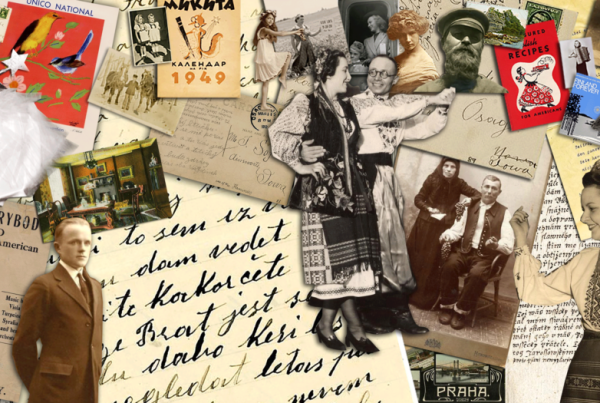By Daniel Necas, Archivist, Immigration History Research Center Archives
An invitation to a workshop (and a kind offer by the organizers from Coventry University to cover expenses) brought me to Europe for a couple of weeks in March. It was my first time of travelling to Omagh, Northern Ireland, where I was to meet with a group of corpus linguists, historians and computer programmers interested in digitizing and studying migrant correspondence. They came from places such as Germany, France, Ireland, Spain, England, and the Netherlands, to offer their perspectives to supplement those of the locals from the Mellon Centre for Migration Studies in Omagh.
Since flying to Europe from Minneapolis works so well through Amsterdam, I also used the opportunity to visit the Europeana Digital Library headquarters in the Royal Library in the Hague to discuss the possibilities of working in the Europeana on-line environment with our European partner institutions involved in the IHRC/A’s project which makes digitized immigrant letters available for research – Digitizing Immigrant Letters. Since all of the digitized letters from the IHRC/A’s project currently reside in the University of Minnesota’s U Media repository and will later this year be included in the Digital Public Library of America (DPLA), we are working to connect this and possibly additional North American content with letters from immigrants to their relatives in Europe where such letters are now mostly archived. Given our past experience of working with the DPLA and Europeana on the “Leaving Europe” exhibition and in view of the close relationships between the two major digital libraries/archives, it appears to be a promising way of bringing together both sides of the migrant correspondence exchanged between the two continents over the past 150 years.
Travel plans are usually made with the intentions of getting somewhere and seeing someone and/or doing something there. As one of the bonus wonders of travel, however, I have become to appreciate the fact that along the way, one almost always learns also from what happens or is encountered unintentionally. On my way to the Royal Library in the Hague, I passed by a large parking area for bicycles. They were stored on multilevel racks full of bicycles of all sorts, obviously used for commuting to the historic center of the old city. Each morning the racks are filled, and in the afternoon the bicycles are retrieved to be used again. Much like archival boxes on shelves, each bike must remain safely and readily accessible. Space is a scarce commodity in the Netherlands, just like in most archives. The solutions found in the Hague and other cities of Holland give me confidence that archivists will figure out ways to store their materials more efficiently. Observing the morning arrivals in the Hague, it was obvious that in addition to the space provided by the city and the cleverly designed technology, deliberate and disciplined behavior of the users (“retrievers” and “re-shelvers”) is an indispensable component in the process of making it work.


-thumb-200x267-191152.jpeg)


